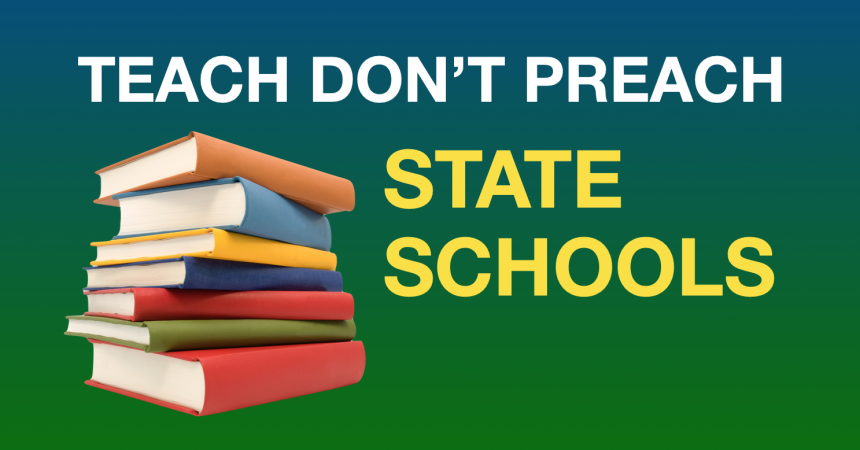
Minister Bruton gets it wrong again – Community National Schools prioritise belief in God over atheism
The Minister for Education, Richard Bruton has got it wrong again in relation to Community National Schools. In response to a Dail question from Sinn Fein’s Carol Nolan, the Minister claimed that the Community National Schools do not prioritise any particular religion or belief. But they do prioritise one particular belief over another, and that is the most fundamental religious belief of all. They prioritise the belief that there is a god over the belief that there is not a god.
One of the aims of the ‘Goodness Me Goodness You’ programme in the Community National Schools is to enable children to learn ‘about’ and ‘from’ religion. Learning ‘about’ and ‘from’ religion is prioritising religious beliefs over non-religious philosophical convictions. The ‘Goodness Me Goodness You’ programme prioritises religious families over non-religious families and over parents that seek a human rights based education for their children.
Prioritising religious beliefs over non-religious philosophical convictions is part and parcel of the state Primary School Curriculum, so it is difficult to understand why the Minister is claiming the opposite. This is something that the Irish Human Rights & Equality Commission has raised in their observations to the Minister on his Admissions to Schools Bill 2016.
The Minister was asked the following question by Carol Nolan TD.
“Carol Nolan (Offaly, Sinn Fein)
99. To ask the Minister for Education and Skills if his Department has undertaken an analysis of the community national school model in terms of inclusion, particularly in terms of those children of minority faith and none at times of religious instruction; and if he will make a statement on the matter. [6466/17]”
Response from Minister Bruton
“Community National Schools are multidenominational, and aim to accommodate parents who wish to have their children learn about different faiths and beliefs while at the same time nurturing children in their own beliefs. The schools do not prioritise any particular religion or belief.
The ‘Goodness Me, Goodness You’ (GMGY) curriculum is the patron’s programme that underpins the characteristic spirit of CNS schools, and is being developed by the National Council for Curriculum and Assessment (NCCA). GMGY is a common programme suitable for pupils of all faiths and beliefs and none.
The Irish Human Rights & Equality Commission stated in their observations to Minister Bruton on his Admissions to Schools Bill that:
“56. Although the Primary School Curriculum envisages that different religions will be accommodated in the religious education curriculum area, the description of that area does not envisage philosophies or beliefs that are not theist: ‘Religious education specifically enables the child to develop spiritual and moral values and to come to a knowledge of God’. The Primary School Curriculum states that it is the responsibility of the school to provide a religious education that is consonant with its ethos and at the same time to be flexible in making alternative organisational arrangements for those who do not wish to avail of the particular religious education it offers. However, there does not appear to be any direction or guidance from the Department of Education and Skills on how schools should make alternative arrangements.”
The Minister for Education is promoting Community National Schools, and claiming that they are suitable for all religions and none. He also says that they do not prioritise any particular religion or belief, when it is clear that they prioritise the belief that there is a god over the belief that there is not a god.
On page 14 of the GMGY Curriculum for Senior class overview it states that:-
Beliefs and religions
This strand seeks to develop children’s understanding of religion and belief, for self and other, through a comparative curriculum of belief and religions. The strand encourages inter-belief dialogue and the sharing of personal belief experience (religious and secular) in order to enable children to learn ‘about’ and ‘from’ religion. The family plays an important role in this strand by informing the child about the beliefs and traditions of the home; the child then shares this perspective with their peers and listens to the perspectives of others. In this strand, parents are enabled to nurture the belief of their child and the school supports them in this process of belief-nurturing.
Minister Bruton has given no direction or guidance on how parents can opt their children out of the ‘Goodness Me Goodness You’ programme. If the Minister recognised and gave guidance on how to opt out of the GMGY programme that reflects the Primary Schools Curriculum, he would have to admit that Community National Schools were not inclusive of those parents that do not adhere to a religious way of life.







0 Comments
No comments!
There are no comments yet, but you can be first to comment this article.